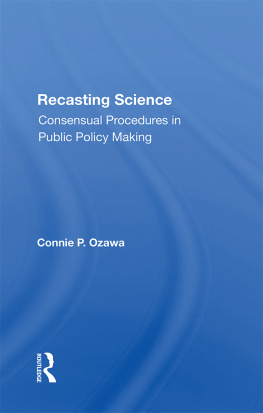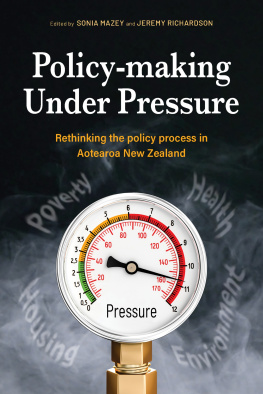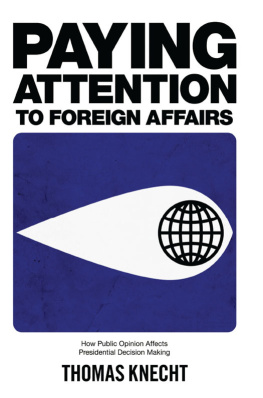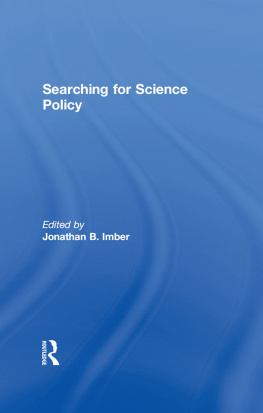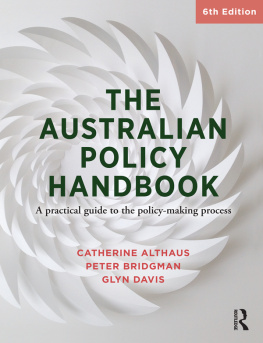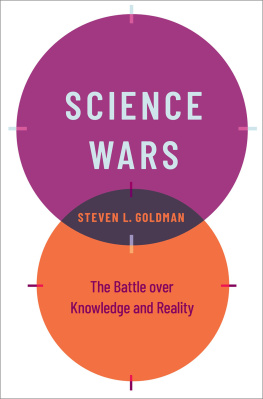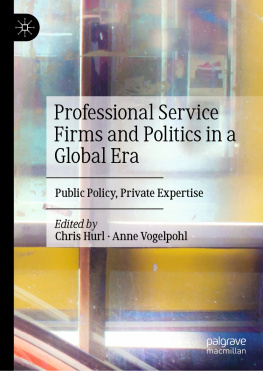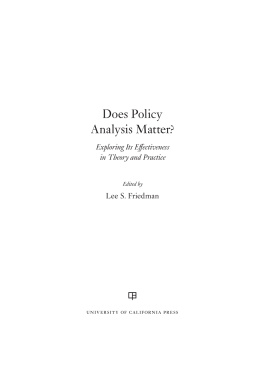Recasting Science
Recasting Science
Consensual Procedures in Public Policy Making
Connie P. Ozawa
First published 1991 by Westview Press, Inc.
Published 2019 by Routledge
52 Vanderbilt Avenue, New York, NY 10017
2 Park Square, Milton Park, Abingdon, Oxon OX14 4RN
Routledge is an imprint of the Taylor & Francis Group, an informa business
Copyright 1991 Taylor & Francis
All rights reserved. No part of this book may be reprinted or reproduced or utilised in any form or by any electronic, mechanical, or other means, now known or hereafter invented, including photocopying and recording, or in any information storage or retrieval system, without permission in writing from the publishers.
Notice:
Product or corporate names may be trademarks or registered trademarks, and are only for identification and explanation without intent to infringe.
Library of Congress Cataloging-in-Publication Data
Ozawa, Connie P.
Recasting science: consensual procedures in public policy making
/ Connie P. Ozawa.
p. cm.
Includes bibliographical references and index.
ISBN 0-8133-7961-X
1. Policy sciences. 2. Scientists in government. I. Title.
H97.093 1991
320'.6dc20 90-21792
CIP
ISBN 13: 978-0-367-28517-3 (hbk)
For Daniel and Jacqueline
Science has been ubiquitous in public decision making in the United States in the 1980s and promises to serve no less a role in the decade and new century ahead. Government actions are justified on the basis of scientific evidence in an overwhelming array of issue areas. Legislating health warnings on cigarette packaging in the 1960s, banning the use of cyclamates, phasing down the lead content of gasoline in the 1970s, and denying construction permits for projects in ecologically sensitive locations are just a few of the multitudinous ways that our public agencies at various levels of government have availed of scientific expertise to assist in the making of public policy throughout the recent decades. Relying on science to make decisions or to resolve disputes is a political tactic, however, and one that threatens to subvert democratic decision making.
Conventional decision making processes cast science into a "conquer or perish" role. Science is held up not as one standard (among many) by which to fashion wise policy options but rather as a weapon wielded by contending stakeholders endeavoring to defeat alternatives they find less desirable. Groups advocating certain policy alternatives marshal out corroborating scientific information and analysis or, more pointedly, arguments or alternative theories that question the soundness of competing policy options. Decision makers, or those responsible for orchestrating the public decision making process, respond by initiating a variety of procedures ostensibly designed to resolve technical disagreements and either establish the superiority of one policy option over others (because of its consistency with the "correct" understanding of technical parameters) or establish the technical constraints within which political claims can be subsequently settled. In neither case is the political nature of scientific argument itself considered.
This book explores the use of science in public decision making, argues that conventional decision making procedures create conditions conducive to unconstructive approaches toward handling scientific information, and suggests that consensus-based procedures offer opportunities for reconciling the political values in science with the more overt political contests seething beneath the surface of public decisions. The discussion is organized around three examples of public decision making, first drawing hypothetical scenarios , the same decision making cases are used to describe three different, actual consensus-based procedures. The analysis considers how these consensus-based procedures measure up against the criticisms of conventional methods and how the role of science is recast.
Changes in decision making processes are not without a redistribution of bias, however. Whether through simple familiarity with the procedures or because of more fixed political economic relationships, some groups are favored by the more prevalent, conventional decision making procedures. Changes in convention may cause such groups to lose their edge, however momentarily. Hence, explores some of the changes in the dynamics of influence that occurred in the cases studied and suggests additional ways that the balance of "power" may change by the augmentation of conventional decision making with consensus-based procedures.
Finally, the advantages and disadvantages of consensus-based procedures are not identical for various stakeholding parties in decisions relying heavily on scientific expertise and information. Moreover, the relative attractiveness of consensus-based procedures compared with the conventional decision making process is likely to vary according to a number of factors unique to any given situation. In the concluding chapter, we consider what these factors are and how stakeholding groups can assess the desirability and political wisdom of participating in a consensus-based procedure.
A discussion of science in public decision making would not be complete without first looking at the history of science in the public decision making institutions. Hence, we begin this discourse in with a review of the ascent of science and the multiple roles it has played in decision making in the United States.
Connie P. Ozawa
Any major project is the work of many, many persons, most of whose contributions pass unrecognized. Although this book formally represents research conducted during my doctoral studies, many of the concerns and ideas explored and extended in this manuscript were presented to me long before the initiation of this project. Consequently, I owe thanks to a lengthy list of persons and situations that helped to direct my curiosity, which eventually led to this inquiry.
In these lines, however, I wish to extend special appreciation to individuals and organizations who provided exceptional support, encouragement, and intellectual guidance in the more concrete phases of this project. I thank Larry Susskind for his commitment to procedural innovations in public decision making and his relentless energy, which continues to inspire so many of us. I am grateful to Deborah Stone and Larry Bacow for helping me to set my questions within a larger policy framework, Harvey Brooks for his helpful insights about the roles of experts, and Deborah Kolb and Michael Wheeler for their help in clarifying and organizing some of the arguments contained in this book.
I would also like to acknowledge the various participants and observers of the cases who tirelessly explained many, many details through lengthy and sometimes multiple conversations. Their openness, interest, and enthusiasm in discussing their experiences were contagious. In particular, I thank Marc David Block at the New York Academy of Sciences, Robert Doherty, Chris Kirtz of the Environmental Protection Agency, and Steve Konkel for sharing documents, interpretations, and insights; conversations with each helped me to understand more clearly what issues were of greatest concern to me.
The National Institute for Dispute Resolution in Washington, D.C., and the Center for Environmental Management at Tufts University provided essential support through research grants. I am grateful to Rob Hollister for facilitating these awards. My coworkers at the Program on Negotiation, Harvard Law School, made my working environment pleasant, egged me on, rescued me during panic-stricken moments, and helped to furnish the finishing touches on this manuscript. Thanks especially to Bill Breslin and Denis Achacoso.

